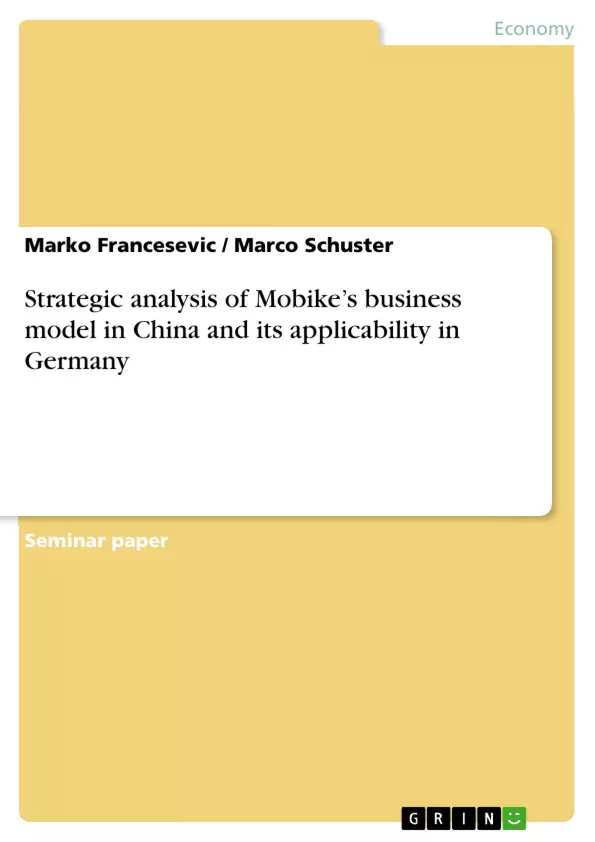Innovative and resource saving mobility offers are needed in times of urbanization, climate change and an increasing scarcity of resources. Car2Go and BlaBlaCar are some of those companies that disrupted the traditional mobility market over the last years. Another example is the Chinese bike rental company “Mobike”, which provides users with flexible, on-demand and nearby access to mobility through a large fleet of bicycles that are distributed across the largest cities in China. The company’s usage of the newest IoT (Internet of Things) technologies and a large amount of funding have resulted in a massive expansion across China, Singapore and just very recently UK in just 1,5 years. It also resulted in a replacement of traditional transport modes, such as the car, as the primary mode of transportation. Thus, one can say that Mobike and its many competitors help to transform Chinese megacities in a less polluted and more liveable area.
All of those mobility disruptors, named before are based on the principle of “sharing economy”. Its most important characteristics are access over ownership and collaborative consumption. Recent social, demographic and political changes in Germany have made mobility schemes based on the “sharing economy” a potential option to traditional transport modes. As climate change and the resulting need to lower emissions is not only a Chinese issue but a global one, it is only fair to ask whether the business model of Mobike can be applied in the German market. Hence, this paper aims to answer the following question: Is the business model of Mobike applicable in the German market?
Inhaltsverzeichnis (Table of Contents)
- Introduction
- Literature review & Methodology
- Methodology
- What is Mobike?
- Strategic analysis of Mobike in China
- Chinese environment analysis
- Political factor
- Economic factor
- Social factor
- Technological factor
- Environmental factor
- Legal Factor
- Mobike's Business Model
- Block 1,2: Customer Segments, Value propositions
- Block 3: Channels
- Block 4: Customer Relationships
- Block 5: Revenue Streams
- Block 6: Key Resources
- Block 7: Key Activities
- Block 8: Key Partnerships
- Block 9: Cost Structure
- SWOT analysis Mobike
- Strengths
- Weaknesses
- Opportunities
- Threats
- Chinese environment analysis
- Analysis of applicability of Mobike's business model in Germany
- Competition analysis of German bike-sharing companies
- Industry Rivalry between established competitors
- Competition from substitutes
- Threat of Entry
- Bargaining power of Buyers
- Supplier Power
- Macro analysis in Germany
- Political
- Economic
- Social and Demographic
- Technological
- Environment
- Legal Factor
- Competition analysis of German bike-sharing companies
- Results & implications
- Key comparison characteristics and implications
- Recommendations
- Conclusion
Zielsetzung und Themenschwerpunkte (Objectives and Key Themes)
This paper aims to explore the feasibility of applying Mobike's business model to the German market. It does so by analyzing the strategic landscape of the Chinese market, examining Mobike's business model, and comparing it to the German market context.
- The feasibility of Mobike's business model in the German market
- Strategic analysis of Mobike's operations in China
- Comparison of the Chinese and German market environments
- The role of "sharing economy" in mobility solutions
- The impact of disruptive technologies on the transportation sector
Zusammenfassung der Kapitel (Chapter Summaries)
- Introduction: Introduces the topic of disruptive mobility solutions and the rise of bike-sharing platforms, specifically Mobike. It states the research question and outlines the paper's structure.
- Literature review & Methodology: Discusses relevant literature on business models, bike sharing, and strategic analysis. It presents a framework for analyzing Mobike's business model.
- What is Mobike?: Provides a brief overview of Mobike's business model and its operations.
- Strategic analysis of Mobike in China: Analyzes the Chinese market environment, including political, economic, social, technological, environmental, and legal factors. It explores Mobike's business model in detail, using the chosen framework.
- Analysis of applicability of Mobike's business model in Germany: Conducts a competition analysis of German bike-sharing companies and a macro analysis of the German market, comparing it to the Chinese context.
- Results & implications: Presents key comparisons and recommendations based on the analysis of the Chinese and German markets.
Schlüsselwörter (Keywords)
This paper focuses on the key concepts of business model analysis, strategic analysis, bike-sharing, mobility solutions, "sharing economy", the Chinese and German market environments, and competitive analysis.
Frequently Asked Questions
What is Mobike's business model?
Mobike is a Chinese bike-sharing company that uses IoT technology to provide flexible, on-demand bicycle access via a mobile app, operating on a "sharing economy" principle.
How does the Chinese market environment support Mobike?
Factors like rapid urbanization, high smartphone penetration, and supportive political goals regarding emission reduction have facilitated Mobike's massive expansion in China.
Is Mobike's model applicable to the German market?
The paper analyzes this by comparing competition, legal factors, and social habits in Germany, noting both opportunities for green mobility and challenges like established competitors and different regulations.
What role does the "sharing economy" play in mobility?
It shifts the focus from ownership to access, allowing for more resource-saving and flexible transportation solutions in crowded urban areas.
What are the SWOT factors for Mobike?
Strengths include advanced IoT tech and funding; weaknesses involve high maintenance costs; opportunities lie in global expansion; and threats include intense competition and changing city regulations.
- Quote paper
- Marko Francesevic (Author), Marco Schuster (Author), 2017, Strategic analysis of Mobike’s business model in China and its applicability in Germany, Munich, GRIN Verlag, https://www.grin.com/document/463946



